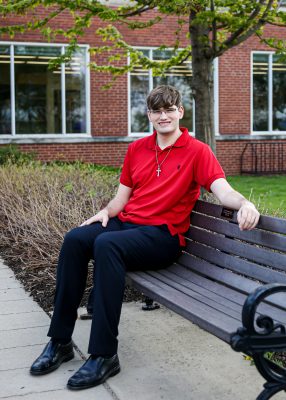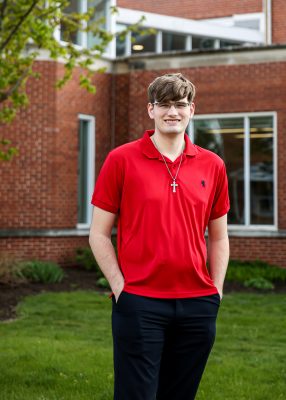Chase Sonnemaker ՚21 finds his path in business analytics

Hometown: Washington, Illinois
B.A. in business analytics with minors in applied statistics and computer science
Questions and answers have been edited for clarity and length.
What are your short and long-term plans after Cornell? I have been offered a position as a business analyst which I intend to accept. After I spend time building my career, I would like to concentrically take classes to work toward a master’s degree in business analytics or computer science.
How has Cornell prepared you for your future? The One Course At A Time block plan has taught me a wide variety of skills that will be critical in the future. I have learned how to work and learn quickly, which are vital skills for analysts who may be working with different offices, businesses, or departments each week. I have also learned how to assume different roles.
At Cornell, we are never simply a student of our major. Each block is so focused that when we are in English classes, we become writers; in science classes, scientists; and in economics classes, economists.
This is vital for an analyst who must often wear the hat of a statistician, programmer, or economist. Finally, the block plan teaches resilience and flexibility. A lot can happen in 18 days and each block is unique. As a result, students learn how to weather even the most difficult lessons and projects while learning to be prepared for anything the block can throw at them. As a result, I feel that I will be able to navigate the hectic business world.
Can you identify people you considered to be mentors at Cornell? I have had more mentors than I can count. From advisors to bosses, everyone I know has been supportive of me and my education. The three that deserve special mention are Associate Director of Dimensions for Health Professions Mark Kendall, Professor of Statistics Brandi Shanata, and Dungy Writing Studio Director Laura Farmer.
Mark Kendall was one of the first people I met at Cornell and was the main person I went to for advice when I started as a biochemistry major. He helped me find my way, determine my career goals, and even after I changed majors, he remained one of my most trusted advisors, constantly lending me support and honest advice.
Brandi Shanata was my first statistics instructor. This class and subsequent conversations with her were key parts of my major change and since then, she has been a source of advice particularly good at provoking reflection and widening my viewpoint. I had the pleasure of working with her this year as part of the COVID-19 response team and it was an enlightening experience.
Laura Farmer was my boss throughout my three years working at the Writing Studio. Through this time I grew from a timid helper to a confident writing consultant thanks to Laura’s influence. Laura’s focus on consultant self-improvement, focus on a common goal, and collaborative leadership style has taught me a lot about good leadership and will remain an inspiration for many years to come.
What is the coolest topic you studied for an 18-day block? What made this block stand out to you? Creative Writing was a class I took for a fine arts credit my first year. I knew the block would be unusual when our professor mentioned that grades were mostly based on completion, which effectively gave everyone free rein to be as creative as they wanted to be. During this class, I produced so many writings that I am still extremely proud of and I really grew as a writer. I was also able to leave my comfort zone and produce works in new formats and writing styles that I had never considered trying before, it was overall a great experience.
If you could share with your high school self some words of wisdom that you’ve learned since being at Cornell, what would it be? My high school self could do with a lot of wisdom honestly; however, the most important piece of advice I would give him is to trust. I worry a lot; yet, I worried even more in high school. I was always unsure of change and the future. As a result, I often dreaded new opportunities and challenges. I would like my high school self to know that, in trust and faith, all works out, oftentimes in ways that he could never imagine.
 What’s something you learned about yourself during your time at Cornell? I learned I was a lot more social than I gave myself credit for. I spent most of high school with a small, but close, group of friends. I have always been introverted and often avoided situations involving people I did not know very well; however, at Cornell, I realized that I quite enjoyed meeting people. I found many groups to spend time with and through the fast blocks, made friends from a variety of majors.
What’s something you learned about yourself during your time at Cornell? I learned I was a lot more social than I gave myself credit for. I spent most of high school with a small, but close, group of friends. I have always been introverted and often avoided situations involving people I did not know very well; however, at Cornell, I realized that I quite enjoyed meeting people. I found many groups to spend time with and through the fast blocks, made friends from a variety of majors.
What is your proudest accomplishment as a Cornellian? I was accepted into Phi Beta Kappa, a very prestigious honor society. While this gave me a huge sense of accomplishment, the real success comes from being a part of the plaque wall in the library. To me, this means that part of me will always be on campus for years to come!
Was there anything you learned at Cornell that changed your perspective significantly? Something I learned how to do at Cornell is to reconcile, seemingly opposing viewpoints. The climate and attitudes of Cornell are often very different compared to where I grew up. As such, it took me a while to solidify my own viewpoints and ideologies. Despite this conflict, I learned how to look at things from everyone’s perspective, especially those I do not agree with. This has made me more understanding of people everywhere and more able to empathize with those I do not agree with.
What’s one thing you did during your time at Cornell that you never thought you’d do? Honestly, if you had asked me in high school which major I was most unlikely to become, I likely would have named in order: math, computer science, and economics. I found these topics to be dull and often needlessly complex. Back then, I considered myself a science and English person, so it was natural that I would major in biochemistry; however, time and time again I have been proven wrong about my educational disposition. My first statistics class proved that math could turn details into real insights, economics proved to be a fascinating study of human decisions, and computer science became a second language. I credit my professors with this change in perspective and I am now a lot more open to the education of any background knowing how wrong I was in the past.
What is your favorite Cornell memory? My favorite Cornell memory is a little odd, to say the least. During my junior year, my roommate and I decided to attempt a rather odd challenge over one of the block breaks. We decided to watch every single “Fast and Furious” movie from start to finish without stopping. We prepared heavily, making supply runs for caffeinated beverages and other forms of sugar. On the Wednesday of the block break, the challenge began. We put a sign up on the door advertising the current movie, inviting friends to attend their favorites, and we watched. About 18 hours later, the challenge ended in success, though I honestly cannot say if I remember anything about the last few movies in the series!
My friends: Solomon, Sabrina, Junior, Robyn, Gabe, Kevin, Isaac, Max, and so many other people here made even the hardest of times better. We went through a tremendous experience together filled with soaring successes and disheartening failures. One of the best parts of my senior year has been sitting back and treasuring the friendship my group has spent so much time testing and building.
When I think of Cornell, I think about my friends, my professors, and everyone else with whom I had the pleasure of connecting with and that, will always make me smile.
Tags: Berry Career Institute, computer science, dimensions, economic-business, economics & business, mathematics, mathematics and statistics, phi beta kappa, senior-profile



